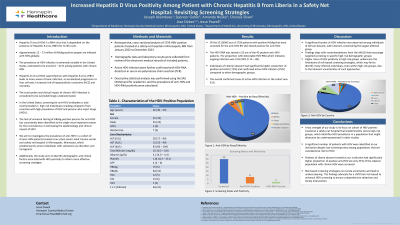Monday Poster Session
Category: Liver
P2863 - Increased Hepatitis D Virus Positivity Among Patient With Chronic Hepatitis B From Liberia in a Safety Net Hospital.
Monday, October 28, 2024
10:30 AM - 4:00 PM ET
Location: Exhibit Hall E

Has Audio
- JP
Jesse G. Powell, PA-C
Hennepin Healthcare
Minneapolis, MN
Presenting Author(s)
Joseph A. Akambase, MBChB1, Jesse A. Powell, PA-C1, Spencer Goble, MD2, Amanda A. Noska, MD1, Jose Debes, MD, PhD3
1Hennepin Healthcare, Minneapolis, MN; 2University of Minnesota, St. Paul, MN; 3University of Minnesota, Minneapolis, MN
Introduction: Hepatitis D virus (HDV) co-infection with Hepatitis B virus (HBV) leads to more severe liver disease, accelerating progression to cirrhosis and hepatocellular carcinoma. Recent literature suggest it may be underdiagnosed due to inconsistent screening practices. Current screening guidelines recommend risk-based screening for HDV, which may overlook many infected individuals This study examines the prevalence of anti-HDV among patients with chronic HBV in a safety net hospital in Minneapolis, Minnesota
Methods: We conducted a retrospective analysis of 1759 HBV-positive patients treated at a safety net hospital in Minneapolis, MN from January 2022 to December 2023. Demographic data, including country of origin, were collected. Serum samples were screened for HDV antibodies using ELISA and confirmed with HDV RNA detection via PCR. Statistical analyses were performed to determine HDV prevalence and identify risk factors associated with HDV positivity
Results: Of the 521[30%] out of 1759 patients with positive HBsAg that were screened for the anti-HDV 8% (42) tested positive for anti-HDV. The HDV RNA was tested in 32 out of the 42 positive anti-HDV patients. The proportion with detectable HDV RNA which indicates ongoing infection was 31% (95% CI 14 – 48). Individuals of Liberian descent had significantly higher proportion of positive anti-HDV, [71%] and confirmed active HDV infection [25%] compared to other demographic groups. The overall confirmed cases of active HDV infection in the cohort was 31%.
Discussion: There was a significant number of patients with HDV identified at our institution despite low screening rates among populations that are considered at risk for HDV. Of particular interest, we found patients of Liberia descent treated at our institution had significantly higher proportion of positive anti-HDV yet only 39 % of the Liberian population with chronic HBV were screened. Risk based screening strategies can create uncertainty and lead to underscreening. We strongly advocate for universal HDV screening for all HBV-positive patients to ensure timely diagnosis and intervention, thereby improving patient outcomes. Adopting universal screening protocols could be a pivotal step in addressing this critical public health issue effectively
Note: The table for this abstract can be viewed in the ePoster Gallery section of the ACG 2024 ePoster Site or in The American Journal of Gastroenterology's abstract supplement issue, both of which will be available starting October 27, 2024.
Disclosures:
Joseph A. Akambase, MBChB1, Jesse A. Powell, PA-C1, Spencer Goble, MD2, Amanda A. Noska, MD1, Jose Debes, MD, PhD3. P2863 - Increased Hepatitis D Virus Positivity Among Patient With Chronic Hepatitis B From Liberia in a Safety Net Hospital., ACG 2024 Annual Scientific Meeting Abstracts. Philadelphia, PA: American College of Gastroenterology.
1Hennepin Healthcare, Minneapolis, MN; 2University of Minnesota, St. Paul, MN; 3University of Minnesota, Minneapolis, MN
Introduction: Hepatitis D virus (HDV) co-infection with Hepatitis B virus (HBV) leads to more severe liver disease, accelerating progression to cirrhosis and hepatocellular carcinoma. Recent literature suggest it may be underdiagnosed due to inconsistent screening practices. Current screening guidelines recommend risk-based screening for HDV, which may overlook many infected individuals This study examines the prevalence of anti-HDV among patients with chronic HBV in a safety net hospital in Minneapolis, Minnesota
Methods: We conducted a retrospective analysis of 1759 HBV-positive patients treated at a safety net hospital in Minneapolis, MN from January 2022 to December 2023. Demographic data, including country of origin, were collected. Serum samples were screened for HDV antibodies using ELISA and confirmed with HDV RNA detection via PCR. Statistical analyses were performed to determine HDV prevalence and identify risk factors associated with HDV positivity
Results: Of the 521[30%] out of 1759 patients with positive HBsAg that were screened for the anti-HDV 8% (42) tested positive for anti-HDV. The HDV RNA was tested in 32 out of the 42 positive anti-HDV patients. The proportion with detectable HDV RNA which indicates ongoing infection was 31% (95% CI 14 – 48). Individuals of Liberian descent had significantly higher proportion of positive anti-HDV, [71%] and confirmed active HDV infection [25%] compared to other demographic groups. The overall confirmed cases of active HDV infection in the cohort was 31%.
Discussion: There was a significant number of patients with HDV identified at our institution despite low screening rates among populations that are considered at risk for HDV. Of particular interest, we found patients of Liberia descent treated at our institution had significantly higher proportion of positive anti-HDV yet only 39 % of the Liberian population with chronic HBV were screened. Risk based screening strategies can create uncertainty and lead to underscreening. We strongly advocate for universal HDV screening for all HBV-positive patients to ensure timely diagnosis and intervention, thereby improving patient outcomes. Adopting universal screening protocols could be a pivotal step in addressing this critical public health issue effectively
Note: The table for this abstract can be viewed in the ePoster Gallery section of the ACG 2024 ePoster Site or in The American Journal of Gastroenterology's abstract supplement issue, both of which will be available starting October 27, 2024.
Disclosures:
Joseph Akambase indicated no relevant financial relationships.
Jesse Powell indicated no relevant financial relationships.
Spencer Goble indicated no relevant financial relationships.
Amanda Noska indicated no relevant financial relationships.
Jose Debes indicated no relevant financial relationships.
Joseph A. Akambase, MBChB1, Jesse A. Powell, PA-C1, Spencer Goble, MD2, Amanda A. Noska, MD1, Jose Debes, MD, PhD3. P2863 - Increased Hepatitis D Virus Positivity Among Patient With Chronic Hepatitis B From Liberia in a Safety Net Hospital., ACG 2024 Annual Scientific Meeting Abstracts. Philadelphia, PA: American College of Gastroenterology.

